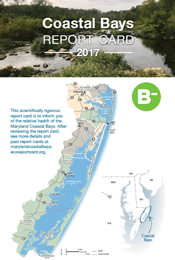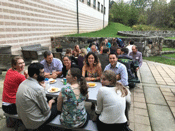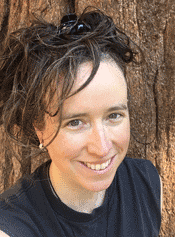Learn how to make an ecosystem health report card
Are you interested in learning the complete report card process to leverage real environmental change in your area? Join IAN's online science communication course and get familiar with all the steps from stakeholder mapping & engagement and conceptualizing ecosystem function to selecting indicators and benchmarks, analyzing data, and communicating results. Sign up or learn more here.Maryland Coastal Bays Report Card 2017 released
 The release of the Maryland Coastal Bays Report Card in Ocean City in September brought some good news. It was the first time that the overall score achieved a B- score, largely due to improvements in Chincoteague Bay nitrogen and phosphorus scores. This was the tenth annual report card produced for the Maryland Coastal Bays. Further improvements will depend on how well we deal with the 'triple threat' of 1) agricultural runoff, 2) Chincoteague Island septic runoff, and 3) entrainment of offshore Ocean City sewage discharge.
The release of the Maryland Coastal Bays Report Card in Ocean City in September brought some good news. It was the first time that the overall score achieved a B- score, largely due to improvements in Chincoteague Bay nitrogen and phosphorus scores. This was the tenth annual report card produced for the Maryland Coastal Bays. Further improvements will depend on how well we deal with the 'triple threat' of 1) agricultural runoff, 2) Chincoteague Island septic runoff, and 3) entrainment of offshore Ocean City sewage discharge.
Old faces, new times at the International Riversymposium 2018
 IAN attended the 21st International Riversymposium, a meeting on river science and management. Bill Dennison, Heath Kelsey, Simon Costanzo partnered with Declan Hearne from the International Water Center to run an interactive workshop on stakeholder engagement theory and techniques which was far more popular than anticipated. Each participant was assigned an avatar representing an imaginary stakeholder in a river basin and were required to develop river basin indicators and scores in isolation, and then as a group, to demonstrate how broad stakeholder involvement improves the legitimacy of report cards and builds relationships. We were joined by two IAN alumni Ben Longstaff (Lake Simcoe Region Conservation Authority in Canada) and Jane Thomas (NESP Northern Australia Environmental Resources Hub) who helped facilitate the workshop.
IAN attended the 21st International Riversymposium, a meeting on river science and management. Bill Dennison, Heath Kelsey, Simon Costanzo partnered with Declan Hearne from the International Water Center to run an interactive workshop on stakeholder engagement theory and techniques which was far more popular than anticipated. Each participant was assigned an avatar representing an imaginary stakeholder in a river basin and were required to develop river basin indicators and scores in isolation, and then as a group, to demonstrate how broad stakeholder involvement improves the legitimacy of report cards and builds relationships. We were joined by two IAN alumni Ben Longstaff (Lake Simcoe Region Conservation Authority in Canada) and Jane Thomas (NESP Northern Australia Environmental Resources Hub) who helped facilitate the workshop.
MEES Colloquium 2018 in the mountains
 The University of Maryland Center for Environmental Sciences Marine and Estuarine Environmental Sciences graduate program (UMCES-MEES) held its annual colloquium on October 5-6, 2018 at the Appalachian Laboratory in Frostburg, MD. This event is a day and a half of collaboration, sharing, and learning for the students in the MEES program and a chance for them to get to know other students and professors throughout the program. A highlight for many students was the discussion panel that included environmental professionals in state and federal positions, at a non-governmental organization, and teaching at a liberal arts university. Read about more highlights and hilarities in Bill Dennison's blog about the event.
The University of Maryland Center for Environmental Sciences Marine and Estuarine Environmental Sciences graduate program (UMCES-MEES) held its annual colloquium on October 5-6, 2018 at the Appalachian Laboratory in Frostburg, MD. This event is a day and a half of collaboration, sharing, and learning for the students in the MEES program and a chance for them to get to know other students and professors throughout the program. A highlight for many students was the discussion panel that included environmental professionals in state and federal positions, at a non-governmental organization, and teaching at a liberal arts university. Read about more highlights and hilarities in Bill Dennison's blog about the event.
IAN welcomes new intern, Kate Petersen
 Kate attended The Evergreen State College in Olympia, Washington where she earned a B.A./B.S. dual degree in ecology and biology with a minor in molecular biology. Her eclectic past research endeavors have included investigations of the ecological variables impacting cryptogam diversity in forest and prairie ecosystems, symbiosis ecology, and the phylogenetics of pelagic seaweed. Currently, she is most interested in research questions addressing global scale forest ecology and climate change mitigation. She plans to pursue a Master's degree in science communication because she believes that scientists must actively participate in the public dissemination of data to help facilitate informed and democratic decision making. In her free time, she pursues art and wilderness.
Kate attended The Evergreen State College in Olympia, Washington where she earned a B.A./B.S. dual degree in ecology and biology with a minor in molecular biology. Her eclectic past research endeavors have included investigations of the ecological variables impacting cryptogam diversity in forest and prairie ecosystems, symbiosis ecology, and the phylogenetics of pelagic seaweed. Currently, she is most interested in research questions addressing global scale forest ecology and climate change mitigation. She plans to pursue a Master's degree in science communication because she believes that scientists must actively participate in the public dissemination of data to help facilitate informed and democratic decision making. In her free time, she pursues art and wilderness.